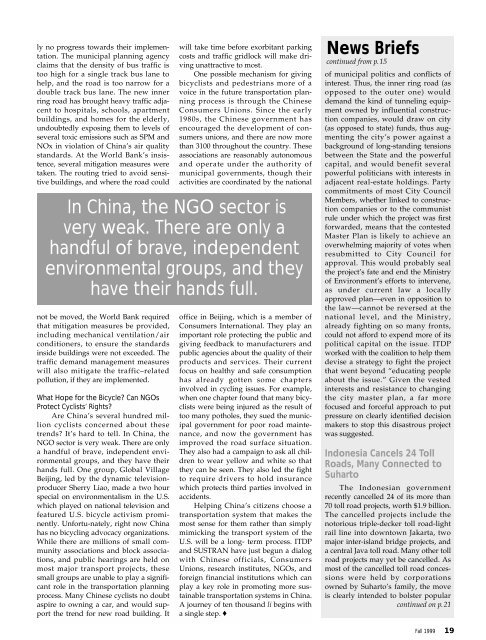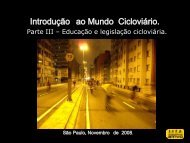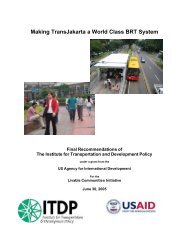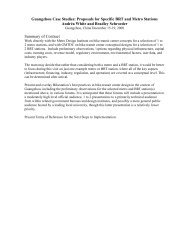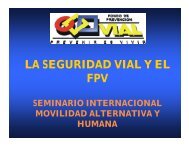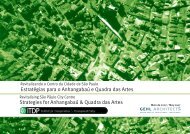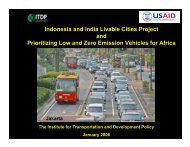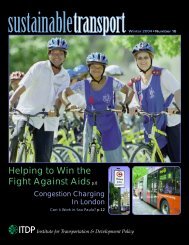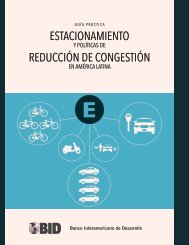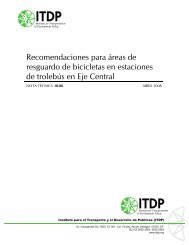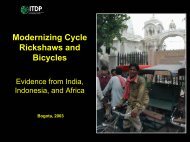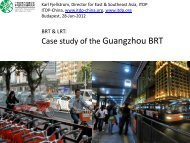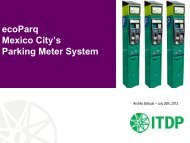Download PDF - ITDP | Institute for Transportation and Development ...
Download PDF - ITDP | Institute for Transportation and Development ...
Download PDF - ITDP | Institute for Transportation and Development ...
Create successful ePaper yourself
Turn your PDF publications into a flip-book with our unique Google optimized e-Paper software.
ly no progress towards their implementation.<br />
The municipal planning agency<br />
claims that the density of bus traffic is<br />
too high <strong>for</strong> a single track bus lane to<br />
help, <strong>and</strong> the road is too narrow <strong>for</strong> a<br />
double track bus lane. The new inner<br />
ring road has brought heavy traffic adjacent<br />
to hospitals, schools, apartment<br />
buildings, <strong>and</strong> homes <strong>for</strong> the elderly,<br />
undoubtedly exposing them to levels of<br />
several toxic emissions such as SPM <strong>and</strong><br />
NOx in violation of China’s air quality<br />
st<strong>and</strong>ards. At the World Bank’s insistence,<br />
several mitigation measures were<br />
taken. The routing tried to avoid sensitive<br />
buildings, <strong>and</strong> where the road could<br />
not be moved, the World Bank required<br />
that mitigation measures be provided,<br />
including mechanical ventilation/air<br />
conditioners, to ensure the st<strong>and</strong>ards<br />
inside buildings were not exceeded. The<br />
traffic dem<strong>and</strong> management measures<br />
will also mitigate the traffic–related<br />
pollution, if they are implemented.<br />
What Hope <strong>for</strong> the Bicycle? Can NGOs<br />
Protect Cyclists’ Rights?<br />
Are China’s several hundred million<br />
cyclists concerned about these<br />
trends? It’s hard to tell. In China, the<br />
NGO sector is very weak. There are only<br />
a h<strong>and</strong>ful of brave, independent environmental<br />
groups, <strong>and</strong> they have their<br />
h<strong>and</strong>s full. One group, Global Village<br />
Beijing, led by the dynamic televisionproducer<br />
Sherry Liao, made a two hour<br />
special on environmentalism in the U.S.<br />
which played on national television <strong>and</strong><br />
featured U.S. bicycle activism prominently.<br />
Un<strong>for</strong>tu-nately, right now China<br />
has no bicycling advocacy organizations.<br />
While there are millions of small community<br />
associations <strong>and</strong> block associations,<br />
<strong>and</strong> public hearings are held on<br />
most major transport projects, these<br />
small groups are unable to play a significant<br />
role in the transportation planning<br />
process. Many Chinese cyclists no doubt<br />
aspire to owning a car, <strong>and</strong> would support<br />
the trend <strong>for</strong> new road building. It<br />
will take time be<strong>for</strong>e exorbitant parking<br />
costs <strong>and</strong> traffic gridlock will make driving<br />
unattractive to most.<br />
One possible mechanism <strong>for</strong> giving<br />
bicyclists <strong>and</strong> pedestrians more of a<br />
voice in the future transportation planning<br />
process is through the Chinese<br />
Consumers Unions. Since the early<br />
1980s, the Chinese government has<br />
encouraged the development of consumers<br />
unions, <strong>and</strong> there are now more<br />
than 3100 throughout the country. These<br />
associations are reasonably autonomous<br />
<strong>and</strong> operate under the authority of<br />
municipal governments, though their<br />
activities are coordinated by the national<br />
In China, the NGO sector is<br />
very weak. There are only a<br />
h<strong>and</strong>ful of brave, independent<br />
environmental groups, <strong>and</strong> they<br />
have their h<strong>and</strong>s full.<br />
office in Beijing, which is a member of<br />
Consumers International. They play an<br />
important role protecting the public <strong>and</strong><br />
giving feedback to manufacturers <strong>and</strong><br />
public agencies about the quality of their<br />
products <strong>and</strong> services. Their current<br />
focus on healthy <strong>and</strong> safe consumption<br />
has already gotten some chapters<br />
involved in cycling issues. For example,<br />
when one chapter found that many bicyclists<br />
were being injured as the result of<br />
too many potholes, they sued the municipal<br />
government <strong>for</strong> poor road maintenance,<br />
<strong>and</strong> now the government has<br />
improved the road surface situation.<br />
They also had a campaign to ask all children<br />
to wear yellow <strong>and</strong> white so that<br />
they can be seen. They also led the fight<br />
to require drivers to hold insurance<br />
which protects third parties involved in<br />
accidents.<br />
Helping China’s citizens choose a<br />
transportation system that makes the<br />
most sense <strong>for</strong> them rather than simply<br />
mimicking the transport system of the<br />
U.S. will be a long- term process. <strong>ITDP</strong><br />
<strong>and</strong> SUSTRAN have just begun a dialog<br />
with Chinese officials, Consumers<br />
Unions, research institutes, NGOs, <strong>and</strong><br />
<strong>for</strong>eign financial institutions which can<br />
play a key role in promoting more sustainable<br />
transportation systems in China.<br />
A journey of ten thous<strong>and</strong> li begins with<br />
a single step. ♦<br />
News Briefs<br />
continued from p.15<br />
of municipal politics <strong>and</strong> conflicts of<br />
interest. Thus, the inner ring road (as<br />
opposed to the outer one) would<br />
dem<strong>and</strong> the kind of tunneling equipment<br />
owned by influential construction<br />
companies, would draw on city<br />
(as opposed to state) funds, thus augmenting<br />
the city’s power against a<br />
background of long-st<strong>and</strong>ing tensions<br />
between the State <strong>and</strong> the powerful<br />
capital, <strong>and</strong> would benefit several<br />
powerful politicians with interests in<br />
adjacent real-estate holdings. Party<br />
commitments of most City Council<br />
Members, whether linked to construction<br />
companies or to the communist<br />
rule under which the project was first<br />
<strong>for</strong>warded, means that the contested<br />
Master Plan is likely to achieve an<br />
overwhelming majority of votes when<br />
resubmitted to City Council <strong>for</strong><br />
approval. This would probably seal<br />
the project’s fate <strong>and</strong> end the Ministry<br />
of Environment’s ef<strong>for</strong>ts to intervene,<br />
as under current law a locally<br />
approved plan—even in opposition to<br />
the law—cannot be reversed at the<br />
national level, <strong>and</strong> the Ministry,<br />
already fighting on so many fronts,<br />
could not af<strong>for</strong>d to expend more of its<br />
political capital on the issue. <strong>ITDP</strong><br />
worked with the coalition to help them<br />
devise a strategy to fight the project<br />
that went beyond “educating people<br />
about the issue.” Given the vested<br />
interests <strong>and</strong> resistance to changing<br />
the city master plan, a far more<br />
focused <strong>and</strong> <strong>for</strong>ceful approach to put<br />
pressure on clearly identified decision<br />
makers to stop this disastrous project<br />
was suggested.<br />
Indonesia Cancels 24 Toll<br />
Roads, Many Connected to<br />
Suharto<br />
The Indonesian government<br />
recently cancelled 24 of its more than<br />
70 toll road projects, worth $1.9 billion.<br />
The cancelled projects include the<br />
notorious triple-decker toll road-light<br />
rail line into downtown Jakarta, two<br />
major inter-isl<strong>and</strong> bridge projects, <strong>and</strong><br />
a central Java toll road. Many other toll<br />
road projects may yet be cancelled. As<br />
most of the cancelled toll road concessions<br />
were held by corporations<br />
owned by Suharto’s family, the move<br />
is clearly intended to bolster popular<br />
continued on p.21<br />
Fall 1999 19


